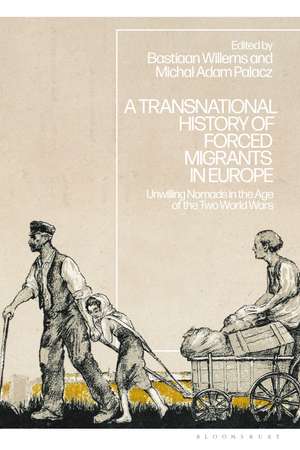A Transnational History of Forced Migrants in Europe: Unwilling Nomads in the Age of the Two World Wars
Editat de Dr Bastiaan Willems, Dr Michal Adam Palaczen Limba Engleză Paperback – 20 mar 2024
| Toate formatele și edițiile | Preț | Express |
|---|---|---|
| Paperback (1) | 192.90 lei 43-57 zile | |
| Bloomsbury Publishing – 20 mar 2024 | 192.90 lei 43-57 zile | |
| Hardback (1) | 541.20 lei 43-57 zile | +116.81 lei 5-11 zile |
| Bloomsbury Publishing – 7 sep 2022 | 541.20 lei 43-57 zile | +116.81 lei 5-11 zile |
Preț: 192.90 lei
Preț vechi: 250.19 lei
-23% Nou
Puncte Express: 289
Preț estimativ în valută:
36.92€ • 40.12$ • 31.04£
36.92€ • 40.12$ • 31.04£
Carte tipărită la comandă
Livrare economică 21 aprilie-05 mai
Preluare comenzi: 021 569.72.76
Specificații
ISBN-13: 9781350281080
ISBN-10: 1350281085
Pagini: 296
Ilustrații: 4 bw illus
Dimensiuni: 156 x 234 x 25 mm
Greutate: 0.42 kg
Editura: Bloomsbury Publishing
Colecția Bloomsbury Academic
Locul publicării:London, United Kingdom
ISBN-10: 1350281085
Pagini: 296
Ilustrații: 4 bw illus
Dimensiuni: 156 x 234 x 25 mm
Greutate: 0.42 kg
Editura: Bloomsbury Publishing
Colecția Bloomsbury Academic
Locul publicării:London, United Kingdom
Caracteristici
Transnational approach puts case studies in a broader context, showing the connections between them and defining overarching themes
Notă biografică
Bastiaan Willems is Lecturer in the History of War in 20th-Century Europe at Lancaster University, UK. He is the author of Violence in Defeat: The Wehrmacht on German Soil, 1944-1945 (2021) and co-editor of Reflections on Perpetration and Complicity under Nazism and Beyond: Compromised Identities? (forthcoming, Bloomsbury).Michal Adam Palacz is Postdoctoral Researcher in History at Oxford Brookes University, UK. He specializes in the transnational history of medicine and migration.
Cuprins
Foreword, Andreas KossertIntroduction: Unwilling Nomads: A Four-Dimensional Model of Diaspora, Bastiaan Willems (Lancaster University, UK) and Michal Adam Palacz (Oxford Brooks University, UK)Part I - Forced Migrants during the First World War1. Population movement, evacuation and internment in Habsburg Galicia during the First World War: Considering the four-dimensional model of diaspora, Serhiy Choliy (Sikorsky Kyiv Polytechnic Institute, Ukraine)2. Humiliated and insulted: The multiple categories of Austro-Hungarian civilian internees, 1914-17, Egor Lykov (ETH Zurich, Switzerland)3. Between Suffering and Displacement: The Case of the Istrian 'Evakuirci', Diego Han (University of Zagreb, Croatia)Part II - Political Emigrants in the Interwar Era4. Salvaging the 'unredeemed' in Italy: The Kingdom of Yugoslavia and the Julian March émigrés, Miha Zobec (Slovenian Academy of Sciences and Arts, Slovenia)5. Ukrainian emigration in the Weimar Republic and its role in German foreign policy, Veronika Weisheimer (European University Viadrina Frankfurt, Germany)6. Protecting the national identity of Russian emigrants and their children in interwar Eastern Europe, Aleksandra Mikulenok (Russian State University of Justice, Russia)Part III - People on the move in fascist Europe7. Stefi Kiesler: A Librarian as 'Intellectual Refugee Service', Jill Meißner-Wolfbeisser (University of Vienna, Austria)8. The catalysts of 1938: European child evacuations as humanitarian innovation, Chelsea Sambells (University of Huddersfield, UK)9. 'And Without a Hat!': Refugee women in the transit country Portugal after 1933, Katrin Sippel (Austrian Society for Exile Studies, Austria)10. Many Journeys of Exile: Spanish Republican Refugees in France, 1939-1946, David Messenger (University of South Alabama, USA)11. Reclaimed for the Volk: Forced Migration and Assimilation in the Wartime Third Reich, Bradley J. Nichols (University of Missouri, USA)Part IV - Refugees and displaced persons and the Second World War12. The surviving remnant: Subjectification and self-organization in the Jewish DP camp Bergen-Belsen, 1945-8, Lennart Onken (Neuengamme Concentration Camp Memorial, Hamburg, Germany)13. Resettling, repatriating and 'rehabilitating' Polish displaced persons in British-occupied Germany, 1945-51, Samantha K. Knapton (University of Nottingham, UK)14. Ethnopolitical humanitarianism: The post-war resettlement of 2,446 Danube Swabians to Brazil, Cristian Cercel (Ruhr-University Bochum, Germany)15. Anti-communists, communists and migrants in France, 1917-53, Aaron Clift (University of Oxford, UK)Conclusion: Polish Refugees and East Prussian Expellees: Applying the Four-Dimensional Model, Bastiaan Willems (Lancaster University, UK) and Michal Adam Palacz (Oxford Brooks University, UK)Concluding Remarks, Pertti Ahonen (University of Jyväskylä, Finland)Index
Recenzii
A valuable contribution to our understanding of the mass refugee movements which blighted Europe in the era of the two world wars. Using the concept of diaspora and drawing from case studies covering the entire continent, this volume offers innovative insights into a wide range of expulsions during this period.
